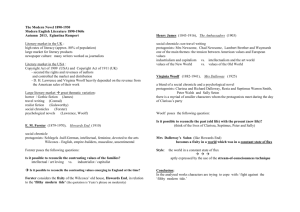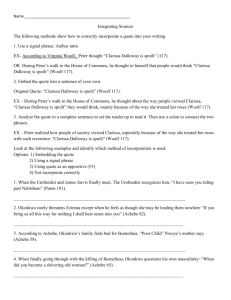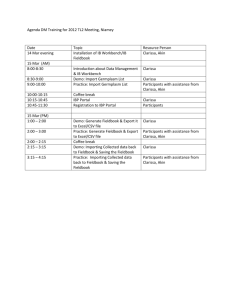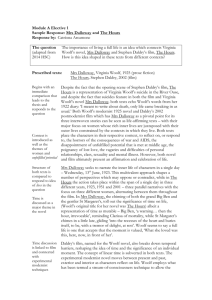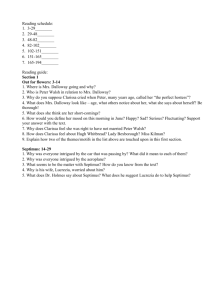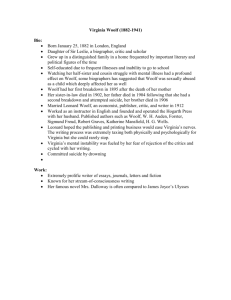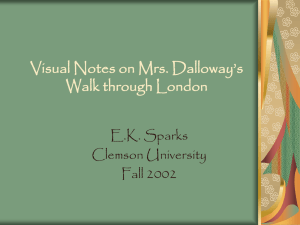Ruth Evans Lane
advertisement
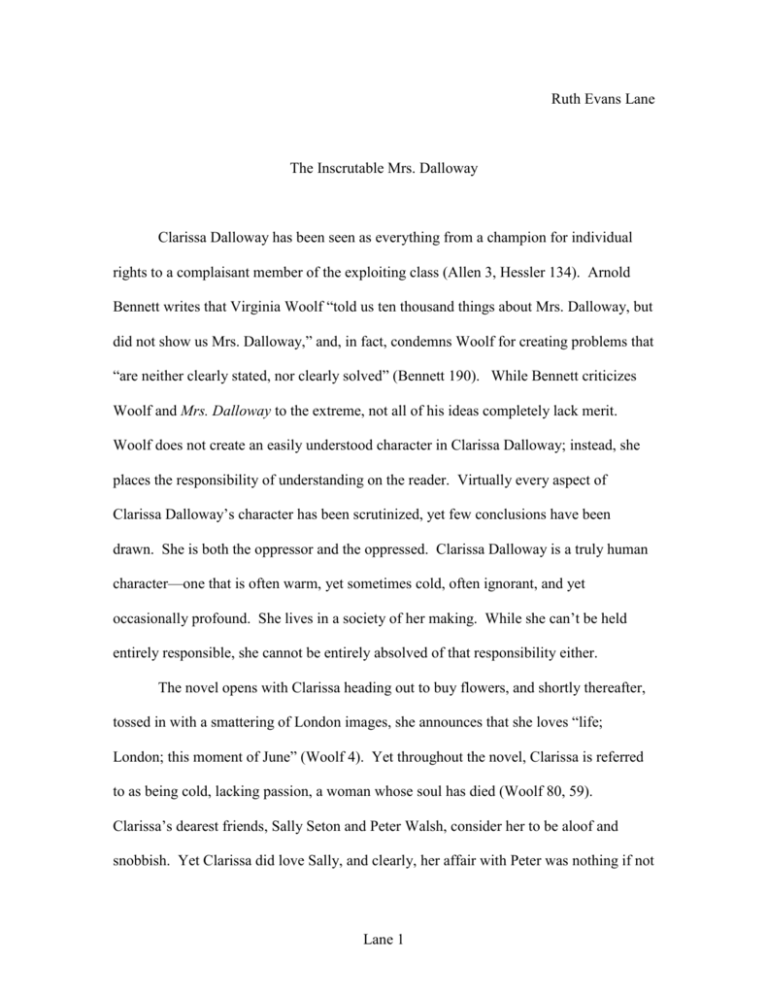
Ruth Evans Lane The Inscrutable Mrs. Dalloway Clarissa Dalloway has been seen as everything from a champion for individual rights to a complaisant member of the exploiting class (Allen 3, Hessler 134). Arnold Bennett writes that Virginia Woolf “told us ten thousand things about Mrs. Dalloway, but did not show us Mrs. Dalloway,” and, in fact, condemns Woolf for creating problems that “are neither clearly stated, nor clearly solved” (Bennett 190). While Bennett criticizes Woolf and Mrs. Dalloway to the extreme, not all of his ideas completely lack merit. Woolf does not create an easily understood character in Clarissa Dalloway; instead, she places the responsibility of understanding on the reader. Virtually every aspect of Clarissa Dalloway’s character has been scrutinized, yet few conclusions have been drawn. She is both the oppressor and the oppressed. Clarissa Dalloway is a truly human character—one that is often warm, yet sometimes cold, often ignorant, and yet occasionally profound. She lives in a society of her making. While she can’t be held entirely responsible, she cannot be entirely absolved of that responsibility either. The novel opens with Clarissa heading out to buy flowers, and shortly thereafter, tossed in with a smattering of London images, she announces that she loves “life; London; this moment of June” (Woolf 4). Yet throughout the novel, Clarissa is referred to as being cold, lacking passion, a woman whose soul has died (Woolf 80, 59). Clarissa’s dearest friends, Sally Seton and Peter Walsh, consider her to be aloof and snobbish. Yet Clarissa did love Sally, and clearly, her affair with Peter was nothing if not Lane 1 passionate. However, during the day in which Mrs. Dalloway takes place, Clarissa denounced passion in its entirety: “Horrible passion…Degrading passion!” (Woolf 127). Is Mrs. Richard Dalloway truly a passionless character? And if that is the case, does she really love life? Clarissa’s relationship with Sally Seton is perhaps the most intriguing in Mrs. Dalloway. Their kiss, given just a fraction of a paragraph in the novel, has provoked question after question regarding Clarissa’s sexuality. Regardless of what their kiss means to various critics, it is clear what it meant to Clarissa. The kiss serves as a sort of symbol of their affections, of their camaraderie. They were once “in league together;” they shared a pure friendship—a friendship with a “quality which could only exist between women” (Woolf 34). Yet, at the party, Sally seems of no more significance than an acquaintance. Their interaction is brief, and simply small talk, but Clarissa “[kindles] all over with pleasure at the thought of the past” (Woolf 172). Nevertheless, it is the past that fills Clarissa with pleasure—not the future, nor the present. Sally Seton, with whom Clarissa shared “the most exquisite moment of her whole life,” has become Lady Rosseter, a name Clarissa can’t even remember, a person she barely recognizes (Woolf 35). But the wild Sally has changed as well. She married a merchant, has five sons, and earns ten thousand a year—hardly the bohemian lifestyle everyone thought certain she would live. In a way, the faded friendship of Sally and Clarissa is far more depressing than the suicide of Septimus Warren Smith. After all the years that have passed since that single summer, Clarissa still attributes “the most exquisite moment of her life” to Sally, and Sally still “[puts] that friendship first” (Woolf 35, 191). This loss serves to characterize all that is lost when one becomes Mrs. Richard Dalloway, or Lady Rosseter. Lane 2 Though it is clear Clarissa truly loved Sally Seton, it is impossible to ascertain exactly what she felt or feels for Peter Walsh. Clarissa ended their affair, and married Richard Dalloway. The reasons behind this decision are remarkable. One could argue that she left him simply because she fell in love with Richard, but Woolf seems to suggest that she left Peter because she fell in love with Peter. Clarissa and Peter certainly had a passion, a bond that she and Richard lack. Their fighting is often mentioned throughout the novel, as well as their making up. Clarissa found this difficult, as “with Peter everything had to be shared; everything gone into. And it was intolerable” (Woolf 8). When Clarissa sees Peter upon his return from India, she realizes: “all in a clap it came over her, If I had married him, this gaiety would have been mine all day!” (Woolf 47). Yet, she chose not to marry Peter, and instead, married Richard, who gave her “a little independence” (Woolf 7). This detail is a telling one: Clarissa chose the marriage where she would have to give the least of her self. Jacob Littleton speculates that “the less intense alliance with Richard allows Clarissa greater space to fill her submerged desires. Peter Walsh might have destroyed this aspect of her, not by mere closeness but by the incessant judgment of her secret beliefs about the world” (7). While it is true that Peter Walsh judges Clarissa harshly, perhaps it is, as Sally and Peter speculate, the Richards of the world who destroy her—the “’perfect gentlemen’ who would ‘stifle her soul’” (Woolf 75). So then, is Clarissa’s assessment of her marriage correct, does this independence allow her to breathe more deeply than if she had chosen Peter, or is Sally and Peter’s? There seems to be truth in both assessments; however, at times it seems as though Clarissa brings up Richard in an attempt to justify her choice, whereas Peter pops Lane 3 up throughout the novel. Clarissa says that her happiness is due to Richard, that “no pleasure could be equal […], this having done with the triumphs of youth, lost herself in the process of living” (Woolf 185). “The process of living”—this hardly seems to be a pleasurable thing—the process, not the pleasure, the joy, or any particularly positive sentiment, but the process. Clarissa has chosen for herself an unremarkable existence, she has chosen to be “Mrs. Dalloway; not even Clarissa any more” (Woolf 11). Michael Lackey writes that “Clarissa believes that we must learn how to interact with individuals before we can help a group of people,” and sees her parties as a sort of celebration of the individual (1). Yet, how is Clarissa celebrating the individual when she goes in and out of rooms at her party, saying “six or seven words” with each guest (Woolf 170)? Peter sees her as being “at her worst—effusive, insincere” (167). Clarissa knows very well the ways of being a good hostess, but does her success as a hostess prove anything other than her mastery of a stereotypical, albeit difficult, role? James Sloan Allen believes that Clarissa “wants to make people go higher, elevating individuals above their isolated, unsocialized selves” (6). While this may be true, it does not seem to follow that her hospitality is anything more than that. Though she may condemn certain oppressive individuals, such as Sir William Bradshaw, she nevertheless welcomes them at her party, and in fact, does not even seem to realize that by receiving these people into her home, she is a part of the establishment that creates them (Hessler 134-35). Her motives may be pure, but her actions are more questionable: Clarissa has clearly chosen her life, thus making it difficult for her to evade responsibility. Though Clarissa seems to avoid love in her personal life, she appears to embrace life—often declaring her great love of it. Peter takes it as given that Clarissa “enjoyed Lane 4 life immensely. It was her nature to enjoy” (Woolf 78). And Clarissa assumes, by extension of her own love of life, that others love life as well (Woolf 4). She sees the “most dejected of miseries sitting on doorstep (drink their downfall)” as being unable to be dealt with “by Acts of Parliament” due to their love of life (Woolf 4). But Clarissa’s line of thinking here seems highly erroneous. Her assessment may be accurate, but regardless, she refuses to see any other explanations for the people drinking on doorsteps. It is merely convenient for her to believe they love life as she does, as her “’connections’ […] do not consult the object connected with” (Hessler 133). And in fact, one must question the sincerity of anyone who must proclaim his or her love of life. While it may be true that Clarissa loves life, her only saying so does not make it worth anything. For a woman who claims to love life so, Clarissa spends much time condemning love. When Peter Walsh tells her of his new love, her response is a denunciation of love—“that monster” (Woolf 45). And Clarissa knows that Peter would say no woman could possibly understand love, to which she concedes, but asks if “any man [could] understand what she meant either? about life?” (Woolf 122). Clarissa sees throwing a party as evidence of her love of life, feels that “it [is] an offering; to combine, to create; but to whom? An offering for the sake of offering perhaps” (Woolf 122). By loving only the abstraction of life, Clarissa is able to avoid giving any part of herself to another person. Clarissa attacks “love and religion! […] How detestable, how detestable they are!” and sees them as “clumsy, hot, domineering, hypocritical, eavesdropping, jealous, infinitely cruel and unscrupulous” (Woolf 126). And so, Clarissa avoids both love and religion—preferring to be a simple observer, a “perfect hostess”—never asking for anything from anybody, nor giving anything of herself. Clarissa fears that “love and Lane 5 religion would destroy that, whatever it was, the privacy of the soul” (Woolf 126-7). But perhaps Clarissa is mistaken—perhaps love and religion feed the soul. Certainly, Peter Walsh thinks so: he sees Clarissa’s soul as already dead, something that died when she was just a girl. Her soul died when she refused to look at the individual: she only looked at the situation, and then she condemned her (Woolf 59). Clarissa has chosen to detach herself from all aspects of life except observation, making it easy for her to avoid close scrutiny. When confronted by Miss Kilman, Clarissa comes close to hatred, to anger, to passion. Yet she quickly dissolves her hatred, remembering that it “was for ideas, not people” (Woolf 126). Miss Kilman is not a pleasant woman: she is bitter, self-righteous, and unforgiving. She does not care for Mrs. Dalloway, and it is her critique of Clarissa’s character that is the most brutal, yet perhaps the most accurate. Doris Kilman judges Clarissa Dalloway as a woman who has “known neither sorrow nor pleasure” (Woolf 125). And she is right—Clarissa, though she has experienced both joyful and sorrowful events, chose to experience these things as an observer, refusing to be swept away by emotion. Woolf does not paint Miss Kilman sympathetically: Miss Kilman is harshly puritanical, though her heart may be in the right place. Hessler writes that “if Clarissa admitted that Doris Kilman were a creature conditioned by her personal history, by her experience of class, then she might also be forced to recognize that she herself has been conditioned by class” (132). Though Clarissa decides to turn her hatred against Miss Kilman’s ideas, and not Miss Kilman, she nevertheless refuses to see the reasons for those ideas. Lane 6 One must wonder if Clarissa’s refusal is, in fact, a true refusal, or if she is just ignorant and completely unable to probe more deeply into the situation. It seems as though Clarissa has chosen ignorance for herself. Indeed, Sally made Clarissa see “how sheltered the life at Bourton was” and they once dreamed of “[reforming] the world” (Woolf 33). Though these were youthful dreams, it is obvious that Clarissa was aware at one time. Jacob Littleton argues that Clarissa’s parties are her art, her attempt to change the world by celebrating the “aspects of humanity in a common culture as well as in Clarissa’s more developed scheme of life” (6). Though this may very well be Clarissa’s intent, it is a far cry from her original hopes of “[founding] a society to abolish private property”—making it very difficult for ignorance to be Clarissa’s excuse (Woolf 33). If one cannot excuse Clarissa on the basis of her ignorance, can one excuse her at all? Lee R. Edwards writes that: The politics of Mrs. Dalloway are such that life is possible only when roses, parties, and joy triumph over war, authority, and death. Clarissa’s celebrations […] are a paradigm of sanity, a medium through which energy can flow into a world which is otherwise cruel, judgmental, and frozen. (100) Yet one must also wonder if such a life is possible without denial. Clarissa says that “the War was over, except for someone like Mrs. Foxcroft at the Embassy last night eating her heart out because that nice boy was killed” (Woolf 5). While the war may be over for Clarissa, clearly it is still part of the collective minds of her fellow Londoners. Indeed, for those like Septimus Smith, the war is just beginning to do its damage. By putting the war out of her mind, Clarissa denies an influence ever-present in so many minds, and perhaps even a part of herself. Lane 7 In Septimus Warren Smith, Virginia Woolf creates a foil for Clarissa Dalloway. By presenting their two perspectives on the world, Woolf was able to portray “’the world seen by the sane and insane side by side’” (Woolf, as qtd. in DiBattista 28). Whereas Clarissa is capable of functioning in the world, Septimus can “hardly walk” (Woolf 66). Septimus is viewed as mad—he does not have “a sense of proportion”(Woolf 96). Clarissa Dalloway seems to share Sir William Bradshaw’s idea of proportion—he is able to attend Clarissa’s party after cleaning up Septimus’s suicide, just as Clarissa is able to go back to her party soon after learning of it. Clarissa and Septimus both watched the death of a loved one: Clarissa, her sister, Septimus, his best friend. Yet the death of Clarissa’s sister comes up only once in the novel, whereas Septimus brings up the death of Evans throughout. Septimus fears that he cannot feel, and feels guilty about not feeling, but fear and guilt are feelings (Edwards 105). But in drawing the inevitable comparison between Clarissa and Septimus, one must question whether or not Clarissa’s survival comes from her success in teaching herself not to feel, her ability to “go on as if nothing had happened” (Woolf 60). Perhaps this is the difference between Septimus and Clarissa: Clarissa is able to conform to William Bradshaw’s standards of sanity, to easily move past the devastation caused by death, war, and the establishment of which she is a part. Just before Septimus “[flings] himself vigorously, violently down on to Mrs. Filmer’s area railings,” he declares that “he did not want to die. Life was good. The sun hot. Only human beings—what did they want?” (Woolf 149). Septimus does not choose to die because of a lack of love for life; he chooses to die because he does not know how to survive as a part of this society—the society created by Clarissa Dalloways. Clarissa is Lane 8 a survivor, and while there is nothing wrong with that, one must ask on what premise does she survive? Septimus and Clarissa undoubtedly have a great deal in common, yet Septimus defenestrates himself, whereas Clarissa is able to go back downstairs. Septimus feels that the world “[threatens] to burst into flames,” and when Clarissa learns of Septimus’s suicide, “her dress flamed, her body burnt” (Woolf 15, 184). Yet Clarissa is able to extinguish those flames. In fact, her first reaction to his suicide is not horror that a young man should kill himself, but that it should be brought up at a party. She may very well be devastated by Septimus’s death, but she is able to quickly recover herself. Her entire existence necessitates denial (Hessler 135). But can Clarissa Dalloway be faulted for suppressing her emotions in a society that encourages proportion above all else—where men like Septimus must choose between being emotional (“unmanly”) or committing suicide? For Septimus had no other choice. He had to either follow the plan of Holmes and Bradshaw and become nothing more than a puppet for proportion or kill himself—either way, he had to resign himself to Bradshaw and Holmes (Blake 2). Septimus “[attached] meanings to words of a symbolical kind”—he “repeated the word ‘war’” (Woolf 96). In order to survive, he would have to, like Clarissa, accept that the war is over and attach no special meaning to the word “war”. But Septimus could not teach himself to repress his feelings, try as he might. Clarissa succeeds at this because she is able to feel only in the abstract. She loves life, but why? She doesn’t seem to love anyone, or anything in particular—Clarissa Dalloway observes, she does not experience. “Mrs. Dalloway said she would buy the flowers herself” (Woolf 3). And so the novel begins, introducing an image that pervades throughout. The choice of flowers is Lane 9 noteworthy: to possess a flower, to put them around one’s home as Clarissa does, one must sever it from its life force. One takes just the bloom, and displays it until death becomes apparent, when it is cast away. Clarissa, because she is rich, is able to afford fresh flowers, and can continually replace the old with the new. However, the Warren Smiths can only buy the flowers that are “almost dead already,” foreshadowing that soon, Septimus will be cast away (Woolf 93). Clarissa is consistently associated with flowers: Richard comes to her bearing “roses, red and white roses,” yet he “could not bring himself to say he loved her; not in so many words” (Woolf 118). Clarissa understands immediately that the flowers are a symbol of his love, for flowers are a symbol for her as well. For Clarissa, flowers symbolize her love of life. Yet freshly cut flowers are cut nevertheless—beautiful though they may be, their days are numbered. Clarissa may be a survivor, but she survives on false premises. Sally Seton offers the clearest perspective on Clarissa Dalloway: “Clarissa was pure-hearted, that was it” (Woolf 191). If nothing else, Clarissa’s intent is always to please. However, a virtuous motive does not excuse her. Yet to fault Clarissa, one must take into account the world that created her. Woolf portrays a “society which works powerfully on people, squeezing them into the required shapes, training their emotions, punishing their misdemeanours, and eliminating the failures, those who cannot conform to the required conventions of selfhood” (Mepham 94). In Mrs. Dalloway, Woolf paints a vivid picture of her world, one where the quest to be oneself is never pleasant—it is even deadly. The social order may very well be what ails Clarissa Dalloway, but she is a part of that very order. There can be no clear assessment of Mrs. Dalloway, for everyone looks upon her through the convoluted lens of society. Lane 10 Works Cited Allen, James Sloan. “Mrs. Dalloway and the Ethics of Civility.” Sewanee Review 107.4 (1999). 15 Nov. 2001 <http://ehostvgw3.epnet.com/delivery.asp..y&startHitNum =8&rlStartHit=8delType=FT>. Bennett, Arnold. “Another Criticism of the New School.” Virginia Woolf: The Critical Heritage. Ed. Robin Majumadar and Allen McLaurin. London: Routledge and Kegan Paul, 1975. 189-90. Blake, Amy. “Woolf’s Mrs. Dalloway.” The Explicator 56.4 (1998). 15 Nov. 2001. <http://proquest.umi.com/pdqweb?TS=10059…1&Dtp=1&Did=00000003341850 5&Mtd=1&Fmt=3>. DiBattista, Maria. Virginia Woolf’s Major Novels: The Fables of Anon. New Haven: Yale UP, 1980. Edwards, Lee R. “War and Roses: The Politics of Mrs. Dalloway.” Major Literary Characters: Clarissa Dalloway. Ed. Harold Bloom. New York: Chelsea House, 1990. 99-112. Hessler, John G. “Moral Accountability in Mrs. Dalloway.” Major Literary Characters: Clarissa Dalloway. Ed. Harold Bloom. New York: Chelsea House, 1990. 126-136. Lackey, Michael. “Woolf’s Mrs. Dalloway.” The Explicator 57.4 (1999). 15 Nov. 2001. <http://proquest.umi.com/pdqweb?TS=10059…1&Dtp=1&Did=00000004532369 2&Mtd=1&Fmt=3>. Littleton, Jacob. “Portrait of the Artist as a Middle-Aged Woman.” Twentieth Century Lane 11 Literature 41.1 (1995). 15 Nov. 2001. <http://www.ehostvgw3epnet.com/deliv ery. asp…startHitNum=41&rlStartHit=41&delType=FT>. Mepham, John. Virginia Woolf. New York: St. Martin’s Press, 1991. Woolf, Virginia. Mrs. Dalloway. San Diego: Harcourt, 1925. Lane 12 Works Consulted Goldman, Jane. The Feminist Aesthetics of Virginia Woolf. Cambridge: Cambridge UP, 1998. Rosenfeld, Natania. Outsiders Together: Virginia and Leonard Woolf. Princeton: Princeton UP, 2000. Lane 13
